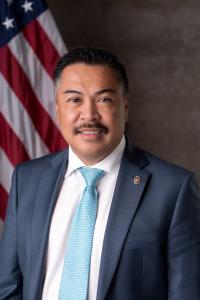Leveraging Partnership Across the Government for Your Safety
July 2022
Dan Solis, Assistant Commissioner for Import Operations
It may be surprising to learn that one of the most important elements in our efforts to provide frontline public health protection is relationships. FDA’s Office of Regulatory Affairs has 1,500 investigators, also known as consumer safety officers (CSOs), located at ports, docks, airports, and other transportation hubs across the country. These highly skilled and dedicated staff screen all imported foods, drugs, and other medical products—keeping a careful eye out for contaminants, disease-causing pathogens, unauthorized drugs, unsafe medicines, and other medical products, and so much more. Every day, while scrutinizing the thousands of import entries coming through, our CSOs also use high-tech tools to identify suspicious substances, including harmful methanol in hand sanitizers, as you can read about in our feature story.
ORA staff works closely with our colleagues in other parts of FDA and from other federal agencies, including U.S. Customs and Border Protection (CBP) and the U.S. Department of Agriculture. These individuals have their own specialized skill sets and expertise that they willingly lend—all towards our shared mission of protecting public health.
During the earlier phase of the pandemic, our collaborations with our CBP colleagues were instrumental in our ability to stop harmful hand sanitizers from flowing into the United States. Their officers instantly, and instinctively, stepped up to help us screen thousands of samples of hand sanitizer products found to contain methanol, 1-propanol, and other prohibited and potentially life-threatening chemical ingredients.
Without our CBP colleagues, the successful implementation of the ‘Operation Dirty Hands’ initiative during the summer of 2020 might not have been possible. Since this time, collaboratively, we intercepted, and scientists then analyzed, more than 400 hand sanitizer samples (in partnership with the FDA Center for Drug Evaluation and Research laboratories) in a hunt for harmful ingredients, findings that resulted in 75 recalls and more than 60 warning letters to noncompliant companies as well as the creation of a web page informing the public of what hand sanitizers they should not use. It also led to the creation of Import Alert #62-08, “Detention Without Physical Examination of Alcohol-Based Hand Sanitizers Manufactured in Mexico,” and Import Alert 66-78 “Detention Without Physical Examination of Drugs, Based Upon Analytic Test Results," to help stop products from entering the U.S. This was particularly the case in Pharr, Texas, where supervisory CSO and 20-year veteran of the agency Emilio Escobar has worked for years facilitating the open flow of information, support, and collegiality between his officers and those of CBP.
Most recently, with the agency hyper-focused on helping to facilitate air shipments of infant formula into the United States, as part of the White House’s ‘Operation Fly Formula’ initiative, ORA has also leaned heavily on the communications we’ve established with many industry partners, including FedEx, DHL, UPS, and other shipping companies, to help ensure the most seamless and safe transport of critically needed infant formula across all parts of our country.
Another vital partnership with CBP includes the U.S. Postal Service where we coordinate oversight of non-commercial entries of regulated products ordered from abroad and entering the U.S. via the international mail facilities (IMFs). FDA investigators at the IMFs confront thousands of FDA regulated product shipments that come from overseas every day. The shared goal is to prohibit any potentially illicit products that could pose public health risk, including unapproved opioid products, counterfeit prescription drugs and medical devices, articles that otherwise appear to illegitimate drugs, and dietary supplements that may contain harmful ingredients from entering the U.S. marketplace. FDA investigators work collaboratively with CBP agents to conduct comprehensive examinations of packages to determine whether certain products should be refused entry to the U.S. Together with CBP and U.S. Postal Inspectors we protect consumers through this robust import oversight program and the FDA presence at IMFs across the country provides a front-line defense against illegal, unapproved, counterfeit, and potentially dangerous drugs from entering the U.S.
We value these vital partnerships and remain intent on advancing relationships with federal and industry partners, as well as state and local entities in cities and towns throughout the U.S. For example, in March of 2022, the Office of Enforcement and Import Operations (OEIO), Division of West Coast Imports (DWCI) entered into a new partnership agreement with the University of Hawaii (UoH) and the State of Hawaii’s Department of Agriculture (HDOA) and Department of Health (HDOH). This agreement formalizes the partner organizations’ mutual commitment to coordinate imported food, cosmetic, drug, and medical device protection efforts in support of their public health and consumer protection missions.
Know that while the world is changing, with global markets becoming ever more complex and new challenges posed by a still evolving COVID-19 pandemic, ORA is fully committed to using all tools at its disposal—including the power of partnerships—in our mission to protect American health.

